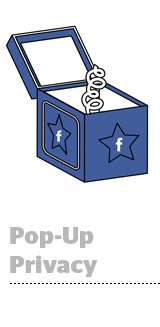
Facebook is setting up a kiosk in midtown Manhattan to dole out free hot cocoa and privacy advice. (Yes, privacy advice.)
At a one-day public pop-up event Thursday in Bryant Park, Facebook reps will answer questions about how people can use their privacy settings and manage their advertising experience on the platform.
The event, a first in the United States, is part of a larger consumer-facing PR and marketing campaign to “put the face behind Facebook,” said Carolyn Everson, Facebook’s VP of global marketing solutions. Other privacy pop-ups were held this year in London, Dubai, Dublin, Ireland and Cologne, Germany. According to Facebook, “thousands” of people came through the EMEA activations.
“Putting people in front of people is a big deal,” Everson said. “They can see that we’re not just some technology company in California.”
Advertisers are still spending on Facebook (Cambridge Analytica, who?), but consumer trust in the platform has plummeted since the scandal.
Facebook was one of the lowest-scoring brands in a consumer trust index released Monday by data platform Jebbit, which asked 1,000 US adults to rate companies on a scale from one to 10. In terms of trust, Facebook scored a “3,” although 50% of respondents did say they “wished they could trust” Facebook more.
“There’s a heightened sense, obviously, of people caring about this based on everything that’s been in the news,” Everson said. “There is also a tremendous amount of education that has to be done, and we view this as an ongoing effort and commitment we have to make.”
The pop-up events are an opportunity to get feedback directly from consumers, who often don’t realize that Facebook has any privacy controls, she said.
“One of our biggest challenges is making sure consumers know how many tools we built for this and also how to use them,” Everson said. “But there isn’t one magic solution to make everyone suddenly aware of our tools.”
Facebook prompts users to run privacy check-ups to review which third-party apps have permissions, as well as who’s able to see their posts and information from their profile. Facebook’s long-promised Clear History feature, which will allow users to see and remove the data Facebook receives about them from other sites and apps, will finally be available in 2019.
But not everyone responds to the prompts, which is why Facebook is taking a multipronged approach to spread awareness. “There’s nothing like having people in front of you holding your phone in their hands, showing you what to do,” Everson said.
Facebook is also prepared for people who might show up angry. That’s OK, Everson said.
“If you have a customer who’s had a bad experience, someone disgruntled, and you have the opportunity to be face-to-face with that person and help turn it, that’s a net positive for the business,” she said. “If people have tough feedback for us, we want it. It’s been a tough year, and hopefully we’re on the path to really simplifying and clarifying what we do and what we don’t do.”
A tough year it certainly has been.
Long before the Cambridge Analytica scandal broke in earnest in March, Facebook was in the crosshairs for enabling election interference in 2016, fake Russian ads, fake news and hate speech in Myanmar and elsewhere. A security breach in September affected 50 million user accounts. In early December, a parliamentary committee in the United Kingdom publicly released a seized cache of internal Facebook emails that seemed to reveal special data-sharing arrangements with specific advertisers.
In other news, Google CEO Sundar Pichai, testifying before the House Judiciary Committee on Tuesday, told lawmakers that it’s a priority for Google to “make it easier for the average user” to navigate its privacy settings. “[It’s] a thing I think we can do better with,” Pichai said.
This post was syndicated from Ad Exchanger.


More Stories
SME-focused PrettyGood launches in Australasia
Blending Boundaries: Crafting Events That Thrive In-Person and Virtually
Who will be the AUNZ Agency Of The Year?